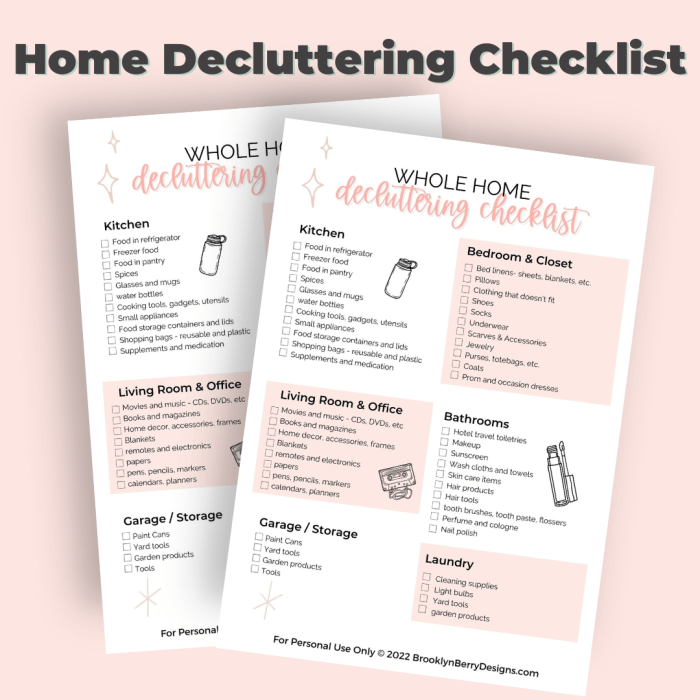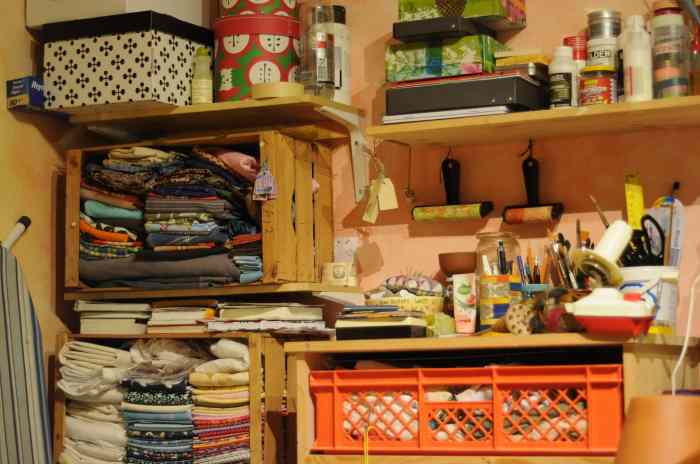Decluttering Tips: Are you tired of feeling overwhelmed by the mess in your living space? Dive into our ultimate guide on decluttering tips to transform your surroundings and boost your mental well-being!
Discover the benefits of decluttering, explore various methods to simplify your belongings, and learn organizational tips to maintain a clutter-free environment long-term.
Benefits of Decluttering: Decluttering Tips
Decluttering your living space can bring a multitude of benefits that go beyond just having a tidy home. It can positively impact your mental well-being and enhance your productivity and focus.
Improved Mental Well-being
Decluttering can have a significant impact on your mental health. A clean and organized space can help reduce feelings of stress and anxiety, creating a sense of calm and tranquility. When your surroundings are clutter-free, you are better able to think clearly and make decisions with a clear mind.
Enhanced Productivity and Focus
By decluttering your living space, you eliminate distractions and create a more conducive environment for productivity. A clutter-free space allows you to focus better on tasks at hand, increasing your efficiency and overall performance. With a clear space, you are less likely to feel overwhelmed and more motivated to tackle your to-do list.
Decluttering Methods

Decluttering can be made easier by following specific methods that help streamline the process and make decisions on what to keep and what to discard. Two popular methods include the KonMari method and the 4-box method.
KonMari Method, Decluttering Tips
The KonMari method, developed by Marie Kondo, focuses on decluttering by category rather than by room. This method involves gathering all items from a specific category, such as clothes or books, in one place and then evaluating each item individually. The key principle of the KonMari method is to only keep items that spark joy and to thank and discard items that no longer serve a purpose.
4-Box Method
The 4-box method is a more systematic approach to decluttering. It involves labeling four boxes or bags as “Keep,” “Donate/Sell,” “Trash,” and “Storage.” As you go through your belongings, you place each item into one of the four boxes based on whether you want to keep, donate/sell, throw away, or store it. This method helps you make quick decisions and prevents second-guessing.
Benefits of Decluttering by Category
- Clothes: Decluttering your wardrobe can help you create a more organized and functional closet, making it easier to choose outfits and reducing decision fatigue.
- Books: Clearing out books you no longer read can free up space and make your book collection more manageable and enjoyable to browse through.
- Kitchen Items: Streamlining your kitchen items can make meal prep more efficient and enjoyable, as well as create more space in your cabinets and drawers.
Tips for Deciding What to Keep and Discard
- Consider Frequency of Use: If you haven’t used an item in over a year, it may be time to let go of it.
- Evaluate Sentimental Value: While sentimental items hold emotional value, it’s essential to assess if they add value to your life or if they’re simply taking up space.
- Quality Over Quantity: Focus on keeping items that are of good quality and serve a specific purpose rather than holding onto things just because you have them.
Organizational Tips

When it comes to maintaining a clutter-free space, organization is key. By implementing effective strategies for organizing your belongings, you can ensure that your space remains tidy and functional. Utilizing storage solutions and organization systems can help you make the most of your space and keep things in order. Here are some tips to help you stay organized long-term:
Utilize Storage Solutions
Maximize your space by using storage solutions such as bins, baskets, shelves, and drawers to keep your belongings organized and easily accessible.
- Invest in storage containers that can be easily stacked or nested to save space.
- Label your storage containers to quickly identify what is inside and make it easier to find items when needed.
- Utilize under-bed storage or over-the-door organizers to make use of vertical space and keep clutter off the floor.
Implement Organization Systems
Establishing organization systems can help you maintain order and prevent clutter from accumulating in the future.
- Create designated spaces for specific items to ensure everything has a place and can easily be put away.
- Develop a daily or weekly cleaning routine to stay on top of clutter and prevent it from building up over time.
- Utilize a filing system for important documents and paperwork to keep them organized and easily accessible.
Maintain an Organized Space
Consistency is key when it comes to maintaining an organized space. By implementing these tips and staying committed to organization, you can enjoy a clutter-free environment long-term.
- Regularly declutter and purge items you no longer need or use to prevent accumulation of unnecessary items.
- Make tidying up a part of your daily routine to ensure that clutter does not have a chance to take over your space.
- Stay mindful of your belongings and avoid bringing in new items unless they serve a specific purpose or bring you joy.
Decluttering Challenges
When it comes to decluttering, there are several challenges that people often face. Overcoming these obstacles and staying motivated throughout the process is key to successfully decluttering your space.
1. Emotional Attachment
One of the biggest challenges when decluttering is letting go of items due to emotional attachment. Whether it’s sentimental value or memories associated with an object, it can be difficult to part ways.
- Try to focus on the present and future rather than the past.
- Remind yourself of the benefits of decluttering and creating a more organized space.
- Take a photo of the item before letting it go to preserve the memory.
2. Decision Fatigue
Making decisions about what to keep, donate, or discard can be overwhelming and lead to decision fatigue, causing many to give up midway through the decluttering process.
- Break the decluttering process into smaller tasks to avoid feeling overwhelmed.
- Set a timer for short decluttering sessions to maintain focus and prevent burnout.
- Ask yourself if the item serves a purpose or brings you joy to make decisions easier.
3. Lack of Time
Another common challenge is finding the time to declutter amidst a busy schedule. Many people struggle to prioritize decluttering over other commitments.
- Schedule decluttering sessions in advance to make it a priority.
- Start with small, manageable tasks that can be completed in short time frames.
- Involve family members or friends to help speed up the decluttering process.
4. Reverting to Old Habits
After decluttering, it can be challenging to maintain an organized space and prevent reverting to old habits of accumulating clutter once again.
- Develop a system for organizing and storing items to prevent clutter from building up again.
- Regularly declutter and reassess your belongings to avoid accumulation of unnecessary items.
- Reward yourself for maintaining a clutter-free space to stay motivated.